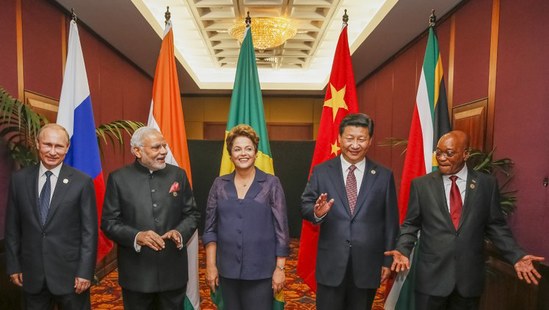Almost exactly eight months ago, the BRICS countries’ foreign ministers issued a statement in The Hague opposing restrictions on the participation of Russian President Vladimir Putin at the G-20 Summit in Australia. At the time, the BRICS countries expressed “concern” over Australian foreign minister Julie Bishop’s comment that Putin could be barred from attending the G-20 Summit in November. “The custodianship of the G-20 belongs to all member-states equally and no one member-state can unilaterally determine its nature and character,” the BRICS said in a statement. Their criticism of Australia’s threat to exclude Russia from the G20 was highly significant, as it was a sign that West would not fully succeed in bringing the entire international community into line in its attempt to isolate Russia.
While not as momentous as the meeting in the Netherlands, the BRICS’ leaders informal meeting at the sidelines of the G20 meeting in Brisbane was mattered in several aspects. First of all, it saved President Putin from near-complete isolation at the summit. Putin was roundly criticized by Western powers, yet photos of his amiable meeting with the BRICS was widely distributed in the Russian media, eager to show that Russia is not without friends in the world.
More importantly, the five leaders underlined their commitment to push for the rapid ratification in their respective parliaments of the creation of the BRICS Development Bank (officially called New Development Bank, NDB). Joint interest in the bank is strengthened by the continued delay of reform of the International Monetary Fund, which makes it easy for BRICS policy makers to criticize the West for its unwillingness to provide emerging powers with their fair share of voting rights. As argued before (“The Case for IMF Quota Reform“), the refusal by US legislators to ratify the reforms approved by the IMF Board of Governors in 2010 is remarkably short-sighted and has the potential to significantly reduce the IMF’s legitimacy in the Global South. Indeed, it is safe to assume that a swift ratification four years ago would have undermined those in Brasília, Moscow, Pretoria, Delhi and Beijing who argue that the BRICS must look for alternatives and complementary structures rather than bet on existing ones.
The delay in ratifying the reforms is all the more alarming because U.S. voting shares would not be reduced by quota reform — rather, European countries would be negatively affected. Privately, Indian and Chinese policy makers wonder how Washington will react once future reforms may push the U.S. below its veto minority. Few expect that the United States would voluntarily accept such a move, which explains why emerging powers have started to establish parallel institutions as a hedge for such a scenario of institutional stalemate.
Still, intra-BRICS cooperation has evolved far too much that the ratification of IMF reform could weaken the grouping. While most observers in the United States and Europe still find it difficult to understand why the BRICS grouping exists in the first place, the BRICS’ decision to organize an informal meeting prior to the G20 shows that the grouping has long turned into a routine for its member countries and an established element of the institutional landscape in the Global South.
The BRICS meeting went beyond mere rhetoric: The grouping announced the formation of an interim board of directors that will lead the next phase establishing the NDB and tasked ministers of finance to designate president and vice-presidents of the NDB prior to the next BRICS summit in Russia next year.
Furthermore, the media note on the meeting read that
The Leaders asked their Finance Ministers and Central Bank Governors to ensure that, by the next BRICS Summit, the CRA Working Group concludes the procedural rules and operational guidelines of the Governing Council and the Standing Committee of the CRA. They also asked their Central Bank Governors to ensure that the Inter-Central Bank Agreement foreseen in the CRA be concluded by the Summit in Russia.
Naturally, such announcements generate considerable expectations, and the meeting can be read as a sign of confidence among BRICS policy makers that the bank will indeed begin to operate by 2016, which would symbolize a historic step towards institutionalization of intra-BRICS cooperation.
Read also:
The politics of next year’s BRICS Summit in Russia
The debate in Brazil: Is there a cost to being a BRICS member?
BRICS: Greatest challenges lie ahead
Photo credit: Roberto Stuckert Filho/PR










